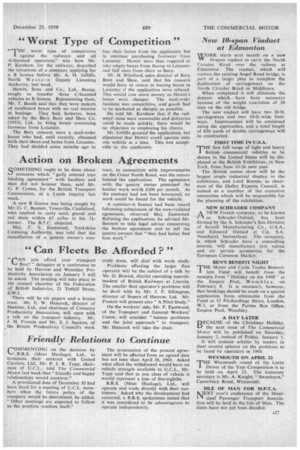"Worst Type of Competition"
Page 29

If you've noticed an error in this article please click here to report it so we can fix it.
" THE worst type of competition
1against the railways and all A-licensed operators," was how Mr. P. Kershaw, for the railways, described the intentions of a company applying for a B licence before Mr. A. H. Jolliffe, North Wes te r n Deputy Licensing Authority, last week.
Hewitt, Sons and Co., Ltd., 8nm:a sought to transfer three C-licensed vehicles to B licence. Representing them, Mr. T. Booth said that they were makers of cardboard boxes with no real interest in haulage. They had, however, been asked by the Bury Boot and Shoe Co. (1953), Ltd., to bring boxes containing footwear from Leicester.
The Bury concern were a mail-order house who had, until recently, obtained both their shoes and boxes from Leicester. They had decided some months ago to buy their boxes from the applicants, but to continue purchasing footwear from Leicester. Hewitt were thus required to take empty boxes from lineup to Leicester and full ones from there to Bury.
Mr. H. Whitford, sales director of Bury Boot and Shoe, said that his concern would have to return to buying boxes in Leicester if the application were refused. This would cost more money as Hewitt's boxes were cheaper. The mail-order business was competitive, and goods had to be marketed as cheaply as possible.
He told Mr. Kershaw that if the railways' rates were reasonable and deliveries could be made quickly, there would be no objection to employing his clients.
Mr. Jolliffe granted the application, but stipulated that Hewitt could operate only one vehicle at a time. This was acceptable to the applicants.
















































































